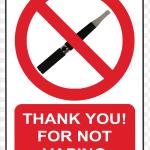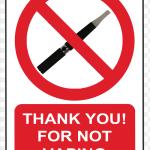Join ACSH directors of bio-sciences and medicine, Cameron English and Dr. Chuck Dinerstein, as they break down these stories:
tobacco
Let's say you wanted to keep as many people smoking as possible. How would you do it? Your best move would be to restrict consumer access to the most popular and effective smoking cessation tool we know of.
Federal regulators are deeply concerned about flavored tobacco, especially vaping products.
"The health care costs attributable to vaping are already substantial and likely to increase." So concluded the authors of a study just published in the journal Tobacco Control.
"Censorship of science is deeply troubling on many levels," the ACLU argued in 2007. "At the most basic, it affronts the fundamental premises of the scientific method ... For science to advance, knowledge must be shared.
When I first told my doctor that I took up vaping as a smoking-cessation tool in 2012, I expected a finger-wagging lecture about the dangers of nicotine. But that's not the response I got.
Regulators and policymakers are on the warpath against vaping.
You know someone is losing an argument when they try to shift the topic of the debate. There is no better example than the public health establishment's foolish campaign against vaping.
If you're a parent, the chances are good that you know at least one other parent who worries about everything: toxic baby food, pesticides, stranger danger, drug use, COVID—you name it, they're worried it's going to kill their children.
“People using e-cigarettes to quit smoking found them to be less helpful than more traditional smoking cessations aids,”












